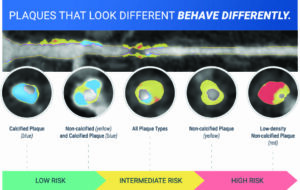Functional Testing
Pinpointing your health threats and imbalances
Treating symptoms without addressing their cause is an endless, exhausting cycle. We can help you determine the presence and source of imbalances or infections in your body so the right therapeutic treatment can be given and you can enjoy the relief of lasting solutions.
We will choose methods of testing based on your health history, the symptoms you are experiencing and your health goals.

Cardiovascular Testing
More than 50% of people who will suffer a heart attack do so without experiencing any prior symptoms and 50% of them have normal LDL (bad) cholesterol levels. Inadequate screening and assessment are a factor in underrecognizing heart disease. That’s why we dig deeper with proper testing.
Cleerly Coronary analysis
Cleerly Coronary analysis (CT angiogram) identifies early, people at risk of heart attacks so they can be prevented. 75% of lesions responsible for heart attacks are missed by conventional stress testing. With a Cleerly coronary analysis your present-day heart disease risk can be identified before a cardiac event becomes inevitable. It is the only test identifying how much and what type of plaque exists in your heart. The analysis is then used to help guide your treatment plan to maintain heart health.

Advanced cardiac markers
Advanced cardiac markers tell us far more about your risk than a standard lipid panel. Lipid sub-particles show not just the amount but risk stratify your LDL. Additional measurements like vascular inflammation, metabolic markers and even genetics help complete the picture of overall risk. The information is then used to help guide your treatment plan to maintain heart health.
Hormone Testing
Men and women often experience distressing symptoms that effect quality of life and heightened disease risk from the changes that occur with aging process, disease, surgery and environmental toxicity. Symptoms of hormonal imbalance include mood changes, anxiety, low energy, weight gain, sexual dysfunction, sleep difficulties and increased risk of heart disease. We screen for hormonal imbalances to help guide your treatment plan to health.
Thyroid and adrenal hormones
Thyroid and adrenal hormones pinpoint causes of chronic fatigue, cholesterol imbalance, mood changes, weight gain and metabolism concerns to offer a targeted plan towards rebalance.
Men’s reproductive hormones
Men’s reproductive hormones identify causes of sexual dysfunction and low libido, low motivation, loss of muscle mass and other symptoms. Results are then used to identify appropriate strategies to support hormonal restoration and healthy aging.
Women’s reproductive hormones
Women’s reproductive hormones identify causes of mood changes, menstrual irregularities, menopausal symptoms, bone loss, low libido, advanced aging and heart disease. Results are then used to identify the best strategies to support hormonal restoration and healthy aging.
Estrogen metabolites
Estrogen metabolites identify causes of symptoms related to women’s reproductive health, menstrual irregularities, poor cognition, cardiovascular health, bone density and skin health. An unfavorable profile is associated with an increased risk of female related cancers. The analysis informs the need to prioritize optimal estrogen metabolism to modify disease risk.

Autoimmune Testing
Increased stressors such as environmental and emotional toxicity, endocrine and immune dysregulation have led to an increased occurrence of autoimmune diseases such as autoimmune thyroiditis, Hashimoto’s, psoriasis, rheumatoid arthritis, Sjogren’s disease, lupus, Crohn’s disease and ulcerative colitis. Testing early for the presence of autoantibodies is the best way to identify and reverse the autoimmune process.
Autoantibodies
Autoantibodies are measured to detect the presence of autoimmune disease and to track the progress of treatment. The elevation of specific autoantibodies suggests active disease of the thyroid, heart, kidneys, intestines, connective tissue and skin; depending on the presence and pattern of the elevation. Further testing for the presence of bacterial, parasitic and viral infections, intestinal permeability and environmental toxicity can give clues to possible triggers of disease.
Gastrointestinal Testing
Chronic digestive discomfort, bloating, irritable bowel syndrome, gut inflammation, altered microbiome, constipation or diarrhea for example have underlying causes that can be found with proper testing. Finding what is wrong is the first step to a solution.
Small intestinal bacterial overgrowth
Small intestinal bacterial overgrowth (SIBO) testing measures the amount of expired hydrogen and methane gas from breath to assess for the overgrowth of gas producing bacteria. Abdominal discomfort, constipation, gas and bloating are typical symptoms of SIBO. Those who have had multiple courses of antibiotics are especially at risk.
Intestinal permeability
Intestinal permeability assesses the integrity of the intestinal lining. Loss of integrity allows for the inappropriate translocation of substances and microbes across the intestinal lining and is known as “leaky gut.” Intestinal permeability is often the explanation for food sensitivities and reactions, inflammation, fatigue and other symptoms.
Helicobacter pylori
Helicobacter pylori testing measures the presence of this gastritis and ulcer causing bacteria via breath testing. H. pylori is associated with gastric and colorectal cancer and Alzheimer’s disease risk. The presence of H. pylori confirms the need for treatment.
Parasitology
Parasitology testing can recognize the cause behind unintentional loss of bodyweight, chronic inflammation, allergies, and gastrointestinal bleeding for example. Standard tests lack the sensitivity to recognize the presence of many of these infections. Parasitic infections can happen in the absence of foreign travel and are underrecognized. The detection of parasites confirms the appropriateness of treatment.


Environmental Toxins
Exposure and storage of environmental toxins are linked to illnesses including cardiovascular disease, insulin resistance, diabetes and obesity, neurologic disease, autoimmune disorders, immune dysfunction and contribute to cancer risk. Increased exposure and/or decreased ability to excrete toxins due to poor nutrition and/or genetic mutations are a setup for environmental toxicity.
Methylenetetrahydrofolate Reductase
Methylenetetrahydrofolate Reductase (MTHFR) tests for unique genetic influences on health such as metabolism and detoxification of environmental toxins and hormones. These mutations even confer cardiovascular risk and denote the need for specific nutritional substrates.
Toxic metal screening
Toxic metal screening assesses the levels of stored toxic heavy metals such as arsenic, lead, mercury, cadmium and many others. Results highlight the relationship between toxic metals and your illness along with helping guide selection of the best agents to chelate them.
Toxic chemical profile
Toxic chemical profile tests for levels of industrial pollutants such as solvents, petrochemicals, herbicides, organophosphate and pyrethroid pesticides, and phthalates. Results help guide the most efficient detoxification and cleansing strategies.
Allergy Testing
Allergies affect up to thirty percent of people. Allergies contribute to pain, disrupted sleep, snoring, sinusitis, learning disabilities in children, fatigue, irritability, work absenteeism, poor work quality and even depression. They can worsen eczema and asthma. Proper testing is the first step to lasting relief.
Environmental allergy
Environmental allergy testing with blood measures your immune reaction to environmental antigens such as pollen, grasses, dander, dust mites, food and mold. The results are used to prescribe a customized oral allergy formula called sublingual immunotherapy (SLIT). Treatment with SLIT desensitizes the immune system to resolve chronic symptoms like seasonal allergies, hay fever, asthma, eczema and food allergies.


